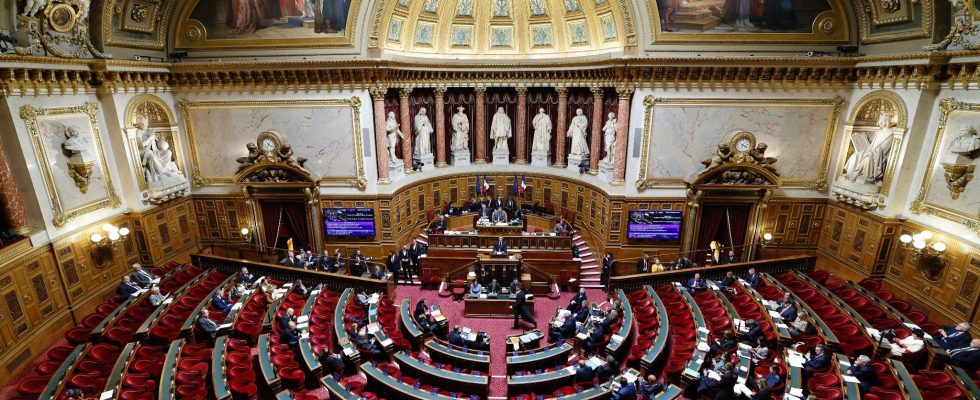It is a lighter version which does not erase the work of the senatorial right. The Law Committee of the National Assembly adopted on the night of Friday December 1 to Saturday December 2 a new version of the immigration bill desired by the government, after its passage by the Senate in mid-November.
This version was therefore validated by a majority of the 73 members of the law committee before the debates and the final vote by all the deputies from December 11. This new text qualifies some of the radical provisions of the Senate, but without turning its back on the right of the Hemicycle, whose votes will prove valuable for the government.
Certain rights of foreigners restored
The first modification of the law committee concerns the most publicized change of the Senate: the abolition of State Medical Aid (AME), allowing the payment of care for undocumented immigrants. This was to be replaced by emergency medical aid in the Senate text. Unsurprisingly, the Commission’s deputies rejected this measure, already criticized in mid-November by several members of the presidential Renaissance party.
The parliamentarians also reversed other senatorial decisions aimed at limiting the rights of refugees and foreign people settling in France. They thus deleted an article aimed at tightening the residence conditions for access to certain social benefits. Same thing regarding access to emergency accommodation for foreigners in an irregular situation, which the Senate wanted to confine to “exceptional circumstances”. This access is restored in the Commission’s version, even if it has maintained an article providing that those refused asylum must leave it.
Access to French nationality not as constrained
Among the other Senate modifications called into question, we also find several measures concerning the conditions imposed on immigrants to settle in France and obtain French nationality. Commission MEPs returned to some of the articles aimed at toughening family reunification. They also removed the offense of illegal residence established by the senatorial majority, as did the end of the automaticity of land law.
The Senate text also provided for a tightening of access to a residence permit for young adults who were taken care of by child welfare before the age of 16, the creation of a “national file of minors unaccompanied offenders”, and the extension of the forfeiture of nationality to dual nationals who have committed a homicide against a person holding public authority. These three measures were also deleted in the MPs’ version.
Conversely, two rights provided for by the government’s initial text but deleted by the Senate were restored by the law commission. Applicants whose nationality indicates a strong chance of obtaining asylum (Afghans, Syrians and Eritreans) will be able to access the job market without waiting for the six-month deadline in force. Same thing for the idea of a residence permit for one year instead of six months which must be granted to people who stop prostitution and embark on a path of social and professional integration. A measure which mainly concerns women in precarious situations.
Nuanced changes from the senatorial right
However, the law committee retained certain ideas of the senators, while simplifying them. This is particularly the case for an article which provided for Parliament to set immigration quotas each year. The measure was transformed into an obligation for the government to present and justify each year to Parliament “quantified objectives” for the next three years. For the left, this nuance still remains a step towards a strict quota policy.
Another important change in the Senate: the questioning of the system for regularizing undocumented workers in professions in shortage, put forward by the government to satisfy its left wing. Between the version of the initial text and the very restricted system of senators, the Commission is thus attempting a “compromise”: the prefect may oppose this regularization in the event of a threat to public order, polygamy or non-compliance with the values of the Republic.
The deputies also approved government proposals to facilitate the expulsion of legally resident foreigners in the event of crimes or misdemeanors punishable by 5 or 10 years, depending on the case, thus raising the thresholds lowered in the Senate. Finally, the Commission’s version extends the ban on placing children in administrative detention centers (CRA) to all minors, rather than only to those under 16 as the Senate wanted.
Several Senate measures retained as such
If the Les Républicains party is already calling for the “unraveling” of the version voted by the right-wing majority in the Senate, the Commission has nevertheless discussed certain measures of the upper house. First, an article proposed by communist senators to grant a temporary residence permit to a foreigner who denounces a slumlord. MEPs even extended it to victims of pimping and human trafficking.
But beyond this measure from the left-wing opposition in the Senate, the rest of the modifications kept by the Assembly’s Law Commission go more in the direction of right-wing elected officials. Access to the residence permit for “sick foreigners” is still reduced in this new version, even if the Law Commission has provided for the recognition of an “exceptional humanitarian circumstance”. Several tightenings of family reunification integrated into the text by the Senate are also maintained, like the requirement for health insurance and the need to benefit from regular resources. This is also the case of closer verification of the “real and serious” nature of the studies of foreign people admitted to France, and of a system excluding foreign people in an irregular situation from a price reduction in transport.
Although the Law Commission calls for some of these measures to be weighed, this variant of the bill nevertheless seems not to seek to annoy the right-wing opposition, on which the government and its relative majority in the Assembly depend to vote on the text. from December 11.
